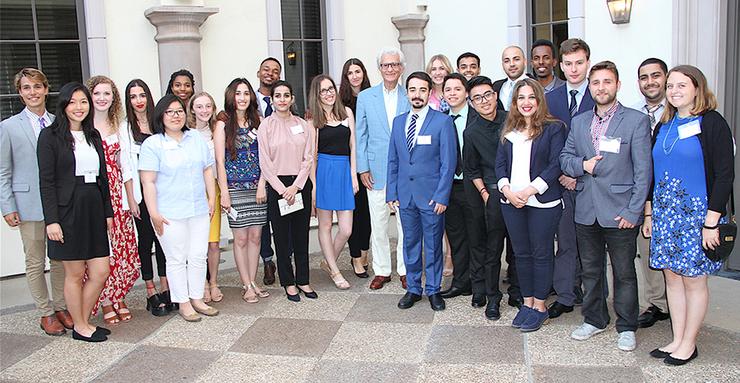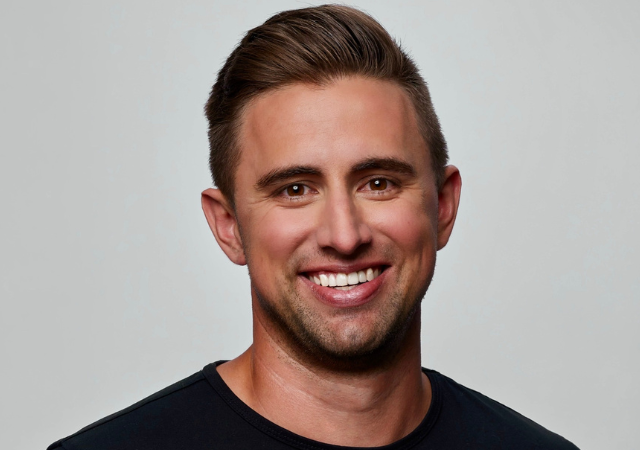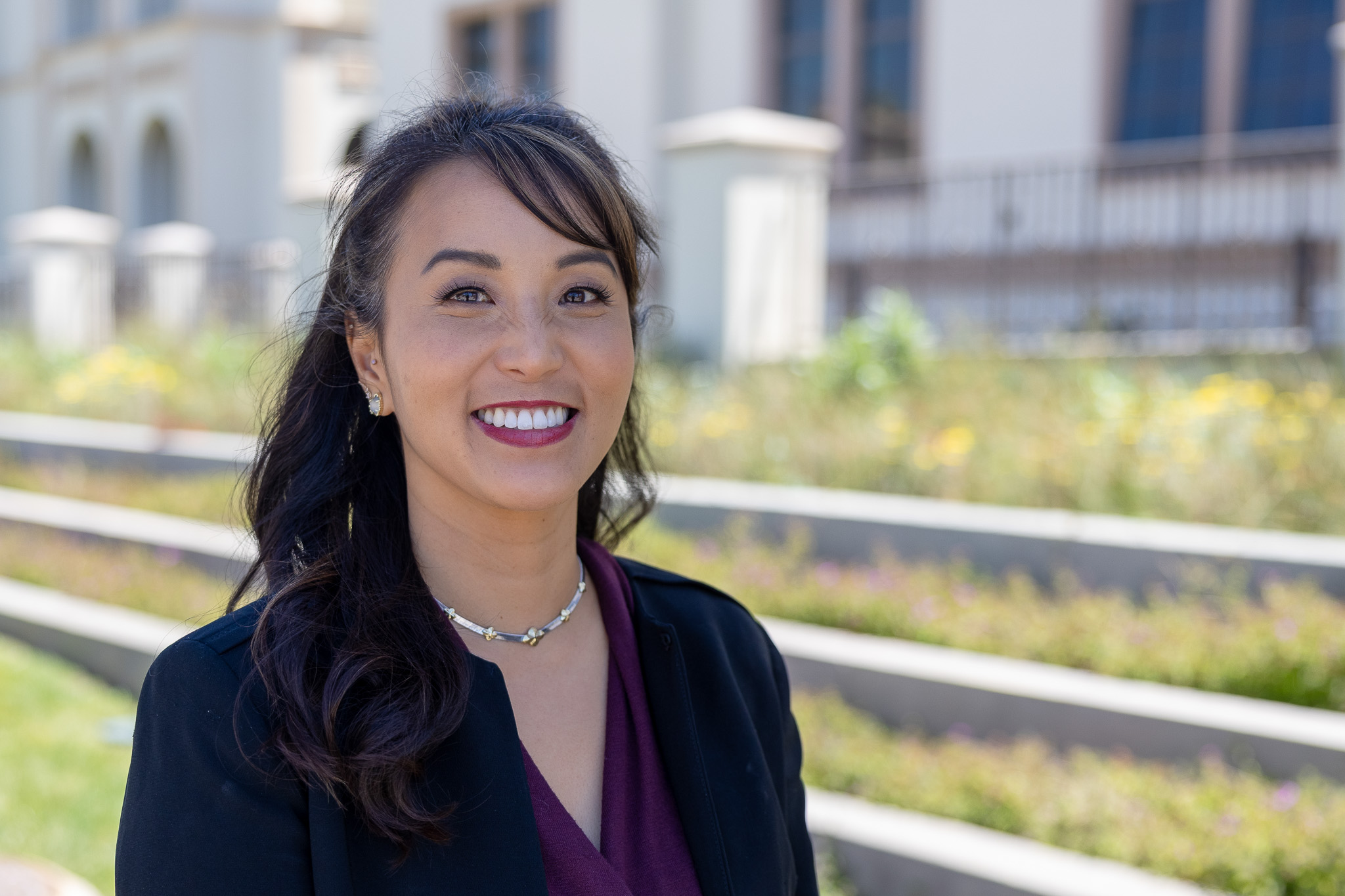Hansen Summer Institute: Building International Understanding, Social Entrepreneurs
 The 2017 Hansen Summer Institute on Leadership and International Cooperation surround Tony Dimitroff, director of the Fred J. Hansen Foundation. The institute program runs at USD through July 23.
The 2017 Hansen Summer Institute on Leadership and International Cooperation surround Tony Dimitroff, director of the Fred J. Hansen Foundation. The institute program runs at USD through July 23.What do you have when 25 young scholars, some from the United States and several from other countries around the world, converge onto the University of San Diego campus in July?
The hope is that those who’ve been chosen from an impressive pool of 1,800 applicants to participate in the Fred J. Hansen Foundation’s Summer Institute on Leadership and International Cooperation seek to live out the dream of the late immigrant entrepreneur.
Hansen’s vast international business travels stimulated his keen interest to create a foundation for a better, more peaceful world. His foundation typically supports efforts in which people from all over the world come together, get to know and learn from each other and become better equipped to understand and tackle challenges faced in the world.
The Hansen Summer Institute, which was initially held and hosted by San Diego State University in 2007, moved to the USD campus in 2013. Tony Dimitroff, who oversees the Hansen Foundation, believes that the institute follows Hansen’s vision, giving an enthusiastic group of bright young people a chance to enjoy each other’s company and to be mindful of the possibilities for peacebuilding.
Providing a unique educational experience, HSI participants learn from USD and other Southern California-area professors, administrators, local community experts as well as from each other about conflict resolution, leadership and social entrepreneurship. Site visits and cultural visits locally are all part of the three-week program’s itinerary.
2017 HSI Participants
This year’s students are: Blerta Begisholli (Kosovo) Maria Agostina Biritos (Argentina), Giorgi Bokuchava (Georgia), Chan Monirak Chhy (Cambodia), Jovana Durdevic (Serbia), Ilker Gul (Turkey), Lais Higashi (Brazil), Bolor Jamiyandagva (Mongolia), Shahnoz jonmamadova (Tajikistan), Alisa Kolesnikova (Ukraine), Patrik Kurath (Hungary), Iliya Kurtev (Bulgaria), Amen Temesgen Lanjore (Ethiopia), Karabelo Maloi (Lesotho), Deepika Pandita (India), Hafiz Usama Tanveer (Pakistan), Asel Tolonova (Kyrgyzstan), Diego Manrique (Guatemala), Kendall Davis (United States, University of Maryland), Ariana Fuller (U.S., BYU), Ciara Gallagher (U.S., University of Oslo, Norway), Rashid Karriti (U.S., Rutgers University), Leah Knobel (U.S., Kansas State University), Samuel Little (U.S., Tufts University) and Samantha Viterbi (U.S., USC).
Manrique, who is the first HSI student representing Guatemala, was thankful to be selected. Interested in international relations, political science and journalism, Manrique looks forward to what he’ll learn, especially in terms of a social entrepreneurship project that he and all participants will pitch on July 21.
“When I saw what the program was about, I saw it as a complement for a lot of projects that I’ve had in my mind, but hadn’t had the opportunity to make a reality,” he said. Interested in creating a citizenship network for youth in Guatemala, Manrique sees HSI as a chance to learn in a new place, with different people who are from different backgrounds, improve his overall skill set and gain new resources.
Kurath, the first HSI student to represent Hungary, is studying at the University of Cambridge in England. He is interested in security politics in conflict areas and has been researching the Israel-Palestine conflict this past year. He is very interested in the possibilities connected to the social entrepreneurship project and brings a steady focus on the European Union and politics that affect its future.
Brazil’s Higashi dreams of making a difference in the world. In the past two years, she has learned about organizations with a desire to create social impact while being financially sustainable. Becoming a social entrepreneur has become her calling. Last year she was invited to lead an NGO called Liter of Light Brazil, which provides solar lighting to communities that don’t have access to electricity or can’t afford it. When applying for HSI, Higashi saw the institute’s website and immediately connected with the program because “there are so many people from so many different places and each one has the same objective. I knew there would be a lot of information to exchange and to learn from,” she said.
HSI Supporters
The program is led by Ronald Bee, HSI’s managing director, a college instructor and an experienced official on world affairs, and Bonnie Lamb, the institute's program coordinator. Working with Bee and Lamb this summer are associate coordinators and 2016 HSI alumni, Berat Kjamili (Macedonia) and Basant Mohamed (Egypt).
The HSI has a significant representation of USD representatives who giving their time and expertise to help the group this summer. These include Kroc School of Peace Studies Professor Ami Carpenter; Professor and former Kroc School of Peace Studies Dean, Father William Headley; Center for Peace and Commerce Director Amitkumar Kakkad and Assistant Director Rachel Christensen; Karen Henken, a lecturer for USD’s Graduate School of Business Administration; Nick Ladany, dean of the School of Leadership and Educational Sciences (SOLES); current SOLES PhD student John Hinck; Co-Director of Mission in University Ministry, Mark Peters; and double USD alumnus Christopher Yanov, founder and president of Reality Changers.
Impact of Each Person's Presence
The ultimate goal for HSI is to continue to build an alumni networking base that already consists of nearly 200 people in 50 countries. At a welcoming reception for the 2017 HSI group on July 2, there were some alumni present, including Mridu Borah of India, who was in the inaugural cohort ten years ago.
“When I came here in 2007, I was a student who wanted to see and get a feel for the (United States), to see the differences between India and the USA. Now, ten years later, I see how much more I am responsible for representing my country and people get an impression of India through me.”
Every attendee at the Hansen Summer Institute is important. Everyone matters, of course, when world peace is the pursuit.
— Ryan T. Blystone



